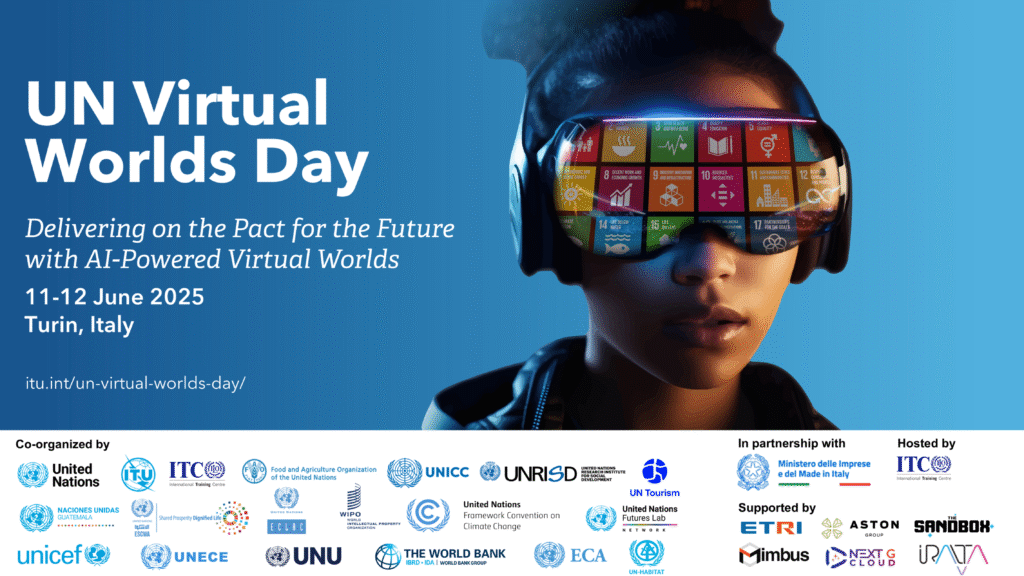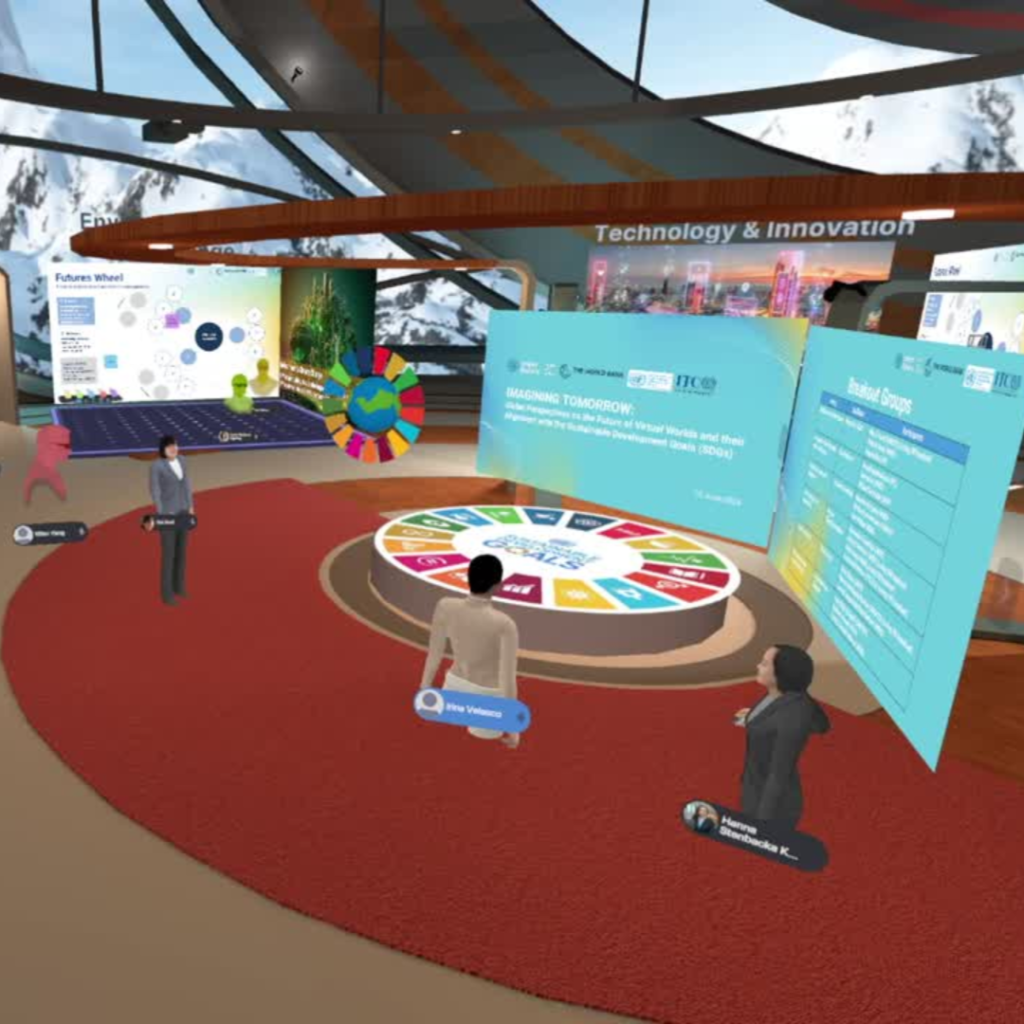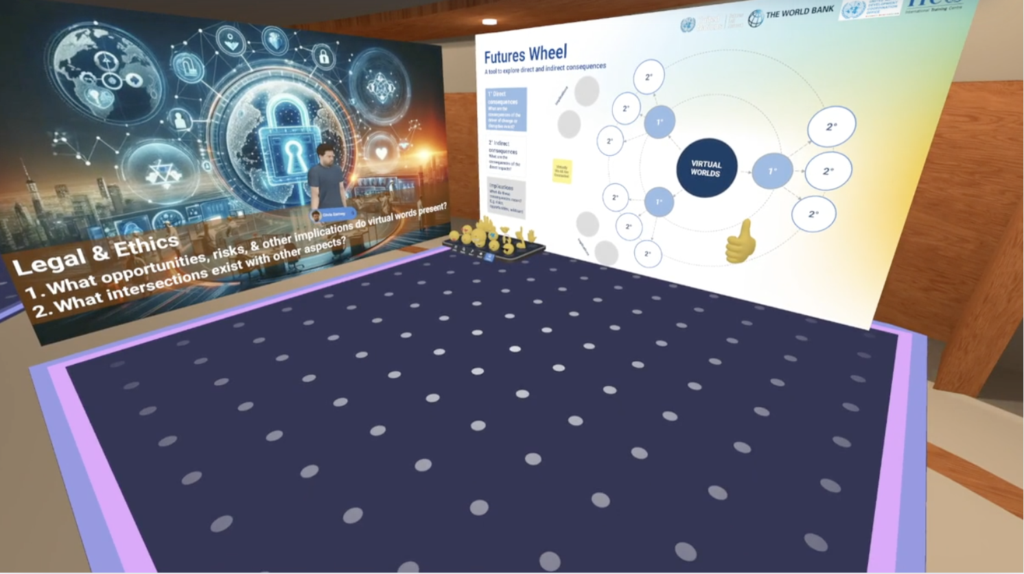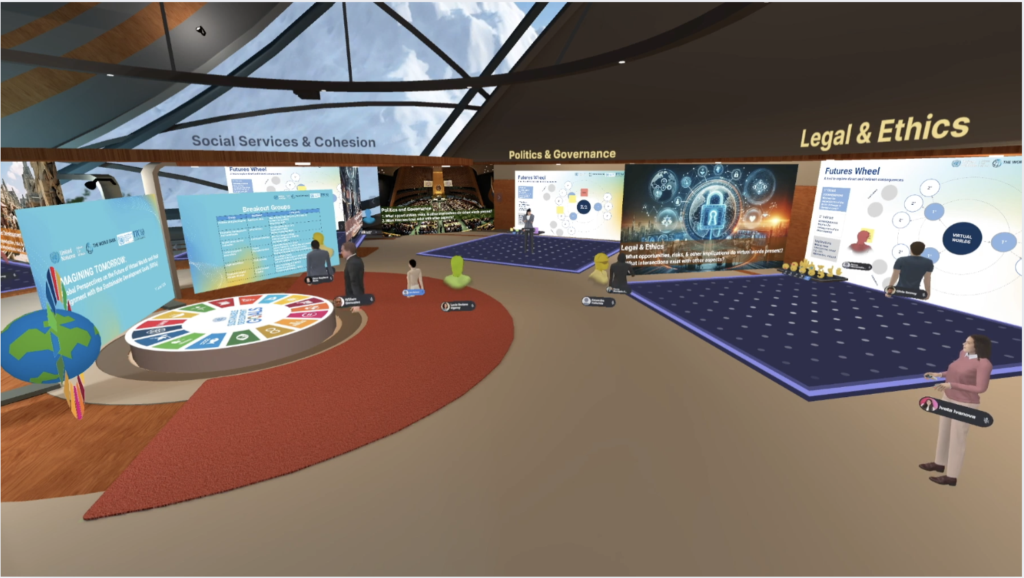UN Virtual Worlds Day





Foresight in action – Navigating the future of emerging technologies
Virtual worlds are evolving rapidly, opening new pathways for inclusive, people-centred approaches to global development. At the UN Futures Lab/Global Hub, we use strategic foresight to explore how emerging technologies, like AI-powered virtual environments and digital twins, could reshape education, employment, governance, and collaboration.
Together with partners, we co-hosted participatory foresight sessions at the 2024 and 2025 UN Virtual Worlds Day events. These sessions invited participants to co-create scenarios, explore future capabilities, and reflect on how to ensure virtual worlds contribute to a more equitable digital future.
2024 | Imagining tomorrow – Exploring the potential of virtual worlds to advance the SDGs and discover opportunities in the future landscape
Friday, 14 June 2024 from 4:30pm – 6:00pm CET

The UN Futures Lab/Global Hub, in partnership with the World Bank, International Training Centre of the ILO (ITC ILO), and the UN Development Coordination Office (DCO), co-hosted, designed, and facilitated an interactive strategic foresight process for the 2024 inaugural UN Virtual Worlds Day in Geneva organized by the International Telecommunication Union (ITU). The process aimed to explore how virtual worlds and the metaverse can drive progress toward achieving the Sustainable Development Goals (SDGs) by facilitating an experience-based discussion in a metaverse environment followed by an in-person visioning workshop. Both sessions drew on foresight methodologies that addressed the intersection of technology with politics, governance, economic development, social cohesion, and environmental sustainability.
- Informed policy recommendations: Provided multistakeholder input on aligning virtual worlds with the SDGs.
- Catalyzed innovation: Highlighted pathways for integrating virtual worlds into global strategies for sustainable development.
- Enhanced collaboration: Connected experts from across sectors to explore shared challenges and opportunities in leveraging digital technologies.
Why it matters
Virtual worlds and the metaverse hold significant potential to transform solutions for global challenges, spanning areas such as education, healthcare, climate action, and governance. The foresight sessions at UN Virtual Worlds Day 2024 underscored both the synergies and challenges these technologies present across various SDGs, including education, health, climate action, and reducing inequalities. They highlighted critical priorities, such as ensuring equitable access, safeguarding user safety, upholding ethical standards, and developing sustainable business models. Additionally, the discussions emphasized the vital role of regulatory frameworks, capacity building, and inclusive design in promoting widespread adoption and scalability of these technologies.
2025 | Envisioning the Future: Scenario Thinking for AI-Powered Virtual Worlds
Thursday, 12 June 2025 from 3:30pm – 4:30pm CET

The World Bank ITS Technology Innovation Office and UN Futures Lab/Global Hub co-hosted “Envisioning the Future: Scenario Thinking for AI-Powered Virtual Worlds” as part of UN Virtual Worlds Day 2025. This session built on the outcomes of the foresight activities undertaken at the UN Virtual Worlds Day 2024, which highlighted critical priorities, such as:
- Ensuring equitable access to technology, infrastructure, and opportunities
- Safeguarding user safety in navigating virtual worlds
- Upholding ethical standards for technology development and regulation
- Developing sustainable business models for responsible investments to address higher upfront costs in the nascent stage of technologies such as the metaverse
Emerging technologies like AI-driven virtual worlds, digital twins, and the metaverse present unique uncertainty and stakes ranging from virtual economies and education to digital governance and citizen rights. The convergence of AI with immersive platforms (Virtual Reality/Augmented Reality), big data, and Internet of Things (IoT) creates a promising yet complex future landscape. It requires an understanding of the thresholds and how these technologies will evolve or interact. These yield multiple potential scenarios, making futures thinking an essential tool to understand how these may impact human abilities. This entails a reimagination of the skills and capabilities needed to facilitate safe and accessible virtual spaces to ensure that the benefits of digital transformation leave no one behind.
Why it matters
The session explored the economic aspects of how AI and virtual technologies can drive sustainable development by reimagining work, jobs, skills, and education of the future. Drawing on a Horizon Scanning process, it presented emerging signals, trends, and drivers of change as a starting point for participants to develop artefacts and explore scenarios on the future of work in AI-powered virtual worlds. The interactive session required participants to actively engage in the group foresight exercise by contributing creative ideas on the capabilities (such as jobs, skills, and education) needed to ensure AI-powered virtual worlds are harnessed for the benefit of all, leaving no one behind.
Outcomes of the session forms part of ITU’s contribution to the Second World Summit for Social Development on how AI-powered virtual worlds can advance people-centred development, particularly through:
- Investment in digital skills development, literacy, and inclusive lifelong learning opportunities for broad participation in digital transformation
- Scenario planning for proactive policy development and preparedness
- Multi-stakeholder platforms to unlock the transformative potential of these technologies to accelerate the implementation of the Pact for the Future and advance the achievement of the SDGs.













